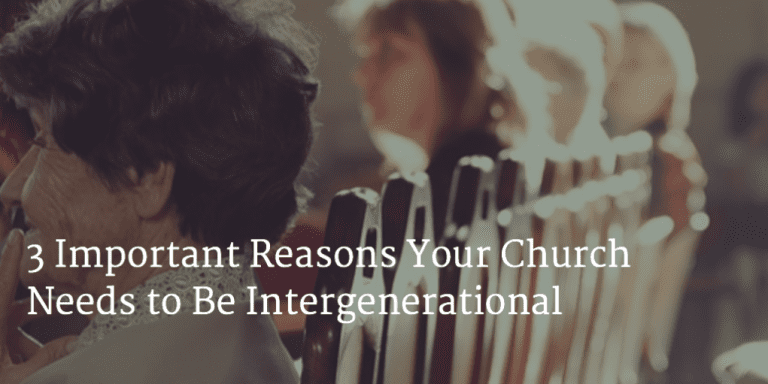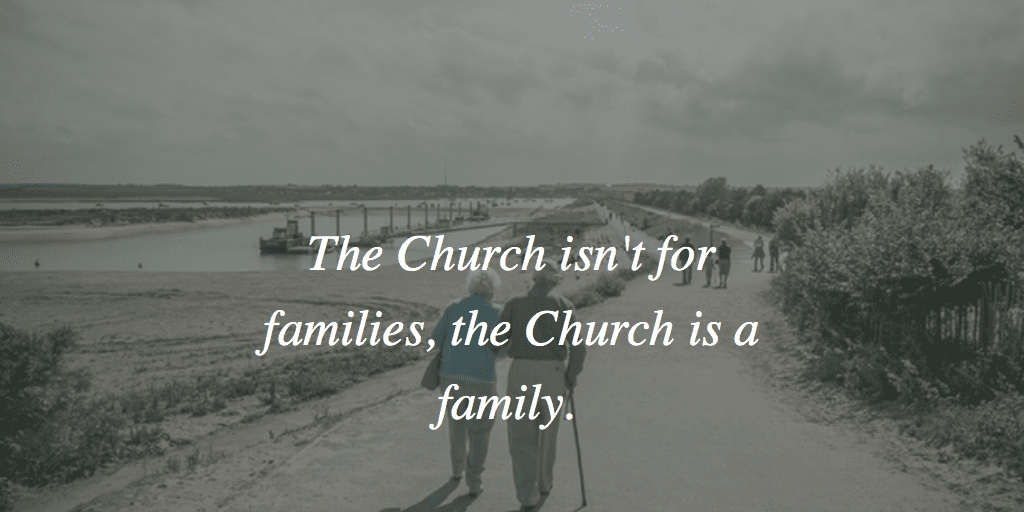 Yesterday at Highland (the church I serve) we had a big day of blessing babies. In both services, we had dozens of young families lined up on stage as they were surrounded by the elders and leaders of the church who laid hands on these young parents.
Yesterday at Highland (the church I serve) we had a big day of blessing babies. In both services, we had dozens of young families lined up on stage as they were surrounded by the elders and leaders of the church who laid hands on these young parents.
Then the entire church raised their hands toward them and blessed them, making promises to walk alongside these children as they grow.
It was a beautiful Gospel moment of people from 5 different generation vowing to raise the next one.
It was church at her best.
It was a reminder of what got me into ministry in the first place.
The first time I walked into the 10 person church I grew up in, I was terrified. It’s not like you can blend into a church where your attendance makes you literally 10% of the congregation
I still remember the church smelled like dust and old songbooks and everyone was just slightly older than Abraham Lincoln…and then there was me.
Growing up, I was by far the only kid in the church, I was the youth group.
And yet, when my parents were going to ground me from something, they’d ground me from Wednesday night church. And I would weep, because those people were my life, they literally made my life.
And I’m a preacher today, heck, I’m a Christian today, because of those older senior saints investing in me.
I grew up in an intergenerational church. I wish everyone could. In my opinion, the only reason churches aren’t anymore is because it’s a lot easier to have a church where everyone thinks/acts and views the world a certain way.
But there is a cost to this (have you noticed the generational divide this past year on your Facebook feed over the SCOTUS decision? Or when we talk about racism or really any social issue?)
These kinds of conversations don’t belong on Facebook, they belong at a potluck.
And because this is such a hard thing for churches to do. I’d like to give 3 brief reasons about why this is such a big deal, and why our churches need to put in the effort to make it happen.
1. The Bible & Jewish/Christian History Commands and Celebrates It
Have you ever noticed how much time the Bible spends telling us to pass this story off to the next generation? In the Jewish faith, this is not just a requirement, it’s something that you are indebted to do.
In Jewish history, telling the next generation the story of God is something like the discharging of debts. And the younger generation has a religious obligation to not just listen, but to place themselves in the story. To really feel like they are Abraham or Sarah or Hannah or David. They have to know this story, after all one day they’ve got to pass it on too.
Did you ever wonder why the Bible spends so much time on genealogies? While they may be the most boring parts of the Bible, there is a reason they are in there. With every name, they are celebrating that these are people who served the purposes of God for their generation. They passed the story of God from their parents on to their kids.
Have you ever noticed how much Jewish people have shaped and blessed the world, and how thought they are such a small group they have such a disproportional amount of influence?
Sociologists have pointed out that the major contributing factor for the Jews ability to create culture and influence society is that each generation doesn’t have to re-invent themselves.
They know who they are. They don’t have to bear the crushing weight of constructing their own identity.
The answer is so simple, but very profound. It’s that they do generational life together. In every festival, in their most sacred moments, the youngest child will ask the oldest man questions like “Why is this night different than all the rest?”
And they will pass the story off from one generation to the next.
Think about how much time Paul spends in his letters (written often from jail) telling the churches he planted such practical things like “Older women need to teach the younger women how to do these things…”
Paul basically invented Pintrest from prison because he knew that it was vital for older generations and younger generations to be in fellowship with one another.
This is certainly true in my own life.
Growing up, the people who made the biggest difference in my life were much older than I was.
They taught me how to preach, and how to be kind to one other when we disagreed, they taught me how to be married, how to be a widow(er), and how to die.
I taught them how to program their VCR’s.
But we’re not very good at this these days…and it’s starting to deeply affect us.
2. It’s Vital to the Health of the Church
Another Patheos blogger, Tim Wright points out that about 40 years ago, the Baby Boomer generation started walking away from almost every institution that their parents had built. And in an effort to win them back, innovative church pastors and leaders began starting churches that, for the first time, were geared for one specific generation.
Sometimes we talk dismissive about “Seeker-services” or “Seeker friendly” churches, but in my experience that comes from a really good desire to be welcoming and hospitable. The problem is that these churches were targeting Boomers during their parenting years, and so in order to create Seeker friendly churches, they also created environments specifically for their kids.
At first, it was just during Bible Classes, but then they started to create entirely separate church times and gatherings for the children. Again, this was all done for noble reasons, trying to evangelize the de-churched Baby-Boomer population, and it was very effective. It only had one really big downside:
We raised the largest unchurched generation in American history.
Here’s how Tim Wright says it:
“By segregating our kids out of worship, we never assimilated them into the life of the congregation. They had no touch points. They had no experience. They had no connection with the main worship service—its liturgy, its music, its space, its environment, and its adults. It was a foreign place to them. And so…once they finished with the kids/or youth program, they left the church. With good intentions we attempted to raise kids to be Christians, but we didn’t raise them to be Churched Christians. And perhaps that, in part, is why so few of them attend a church today. We’ve essentially “Sunday-Schooled” them out of church—because we never assimilated them into church.”
An institution exists to pass on a way of life from generation to generation, and one of the great tragedies of our day is that we are investing huge amounts of resources, and some of our most creative people are giving their lives to create Churches that will only last for one generation, because we’ve failed to think past the immediate moment.
3. The Church is the Family of God
A few months ago, Christianity Today did an article on what happened after all those Baby Boomer Christians grew up. Not the majority of them, but many of them, across all the different denominations started leaving church after their kids became adults.
 And when CT started asking them why, they discovered that these Boomers had grown up with the dangerous notion that church was something that was for people with a nuclear family and after you had put in your time, and raised your kids, it was time to move on.
And when CT started asking them why, they discovered that these Boomers had grown up with the dangerous notion that church was something that was for people with a nuclear family and after you had put in your time, and raised your kids, it was time to move on.
But that fails to realize this one large thing, early Christians baptized Eunochs (Didn’t see that coming did you?)
Remember what a big deal the Bible makes about when they baptized Eunochs? That probably confuses most modern readers, but remember a Eunuch was someone who couldn’t have kids.
Unlike what you may have heard before, a eunuch wasn’t a marginalized, oppressed person.
Generally speaking, they were pretty big deals in the kingdom they were associated with. Because a eunuch was someone who had thrown in his lot completely (and I mean completely) with the royal dynasty. By, ummm, doing what he did, he had forfeited his right to ever having a family. He was giving his future over to the kingdom he was in.
There’s a time in Matthew 19, where Jesus mentions this. Right after He finishes a pretty strong teaching on divorce, Jesus endorses celibacy by saying:
For there are eunuchs who were born that way, and there are eunuchs who have been made eunuchs by others—and there are those who choose to live like eunuchs for the sake of the kingdom of heaven. The one who can accept this should accept it.”
Live like Eunuchs for the sake of the Kingdom of Heaven.
And then, do you know what the very next verse in Matthew is?
Then people brought little children to Jesus for him to place his hands on them and pray for them. But the disciples rebuked them. Jesus said, “Let the little children come to me, and do not hinder them, for the kingdom of heaven belongs to such as these.
Do you see what’s happening here?
Jesus is saying the Eunuchs are welcome into the family of God, the children are welcome into the family of God. Jesus is saying that for parents without children and for children without parents, you have each other because you both have me.
The Church isn’t for families, the Church is a family.
That’s the institution Jesus started, that’s the family Jesus created
And It gives you great life, but it first requires that you lay yours down.
One Generation at a time.
All images from Pablo, some with author modification










